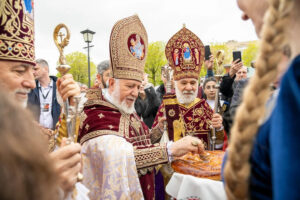According to the Mother See of Holy Echmiadzin, during the consecration ceremony, Karekin II highlighted that relations between Armenians and Belarusians “are anchored on the common values of Christian identity, friendship, traditional perceptions of homeland and family, as well as the precious memories of joint struggles and feats,” while sharing his hope that through Armenians living in Belarus, the ties between the two nations would further strengthen.
He also noted that the construction of the church became possible “thanks to the goodwill of the authorities of Belarus,” adding that it would bring “new vitality to the national and ecclesiastical life of the community.”
In turn, Belarusian Commissioner for Religions and Nationalities Aliaksandr Rumak told BelTA that Armenians make up the sixth largest ethnicity in Belarus, with a population of over 9,500.
“Belarus is a country of peace and accord. People of different confessions and ethnicities live here. There are no disagreements and contradictions between them,” Rumak said, adding that “our country can be an example for other states, where, as we know, many conflicts start precisely because of religious contradictions.”
In addition to consecrating the church, Karekin II also laid flowers at the Victory Monument in Minsk, noting that it was a “great honor” for him.
“Belarus endured a difficult trial and suffered immense losses [in World War II], yet it also made a significant contribution to the victory over fascism. Over 50,000 Armenians participated in the battles on the Belarusian front,” News.by reported Karekin II as saying.
